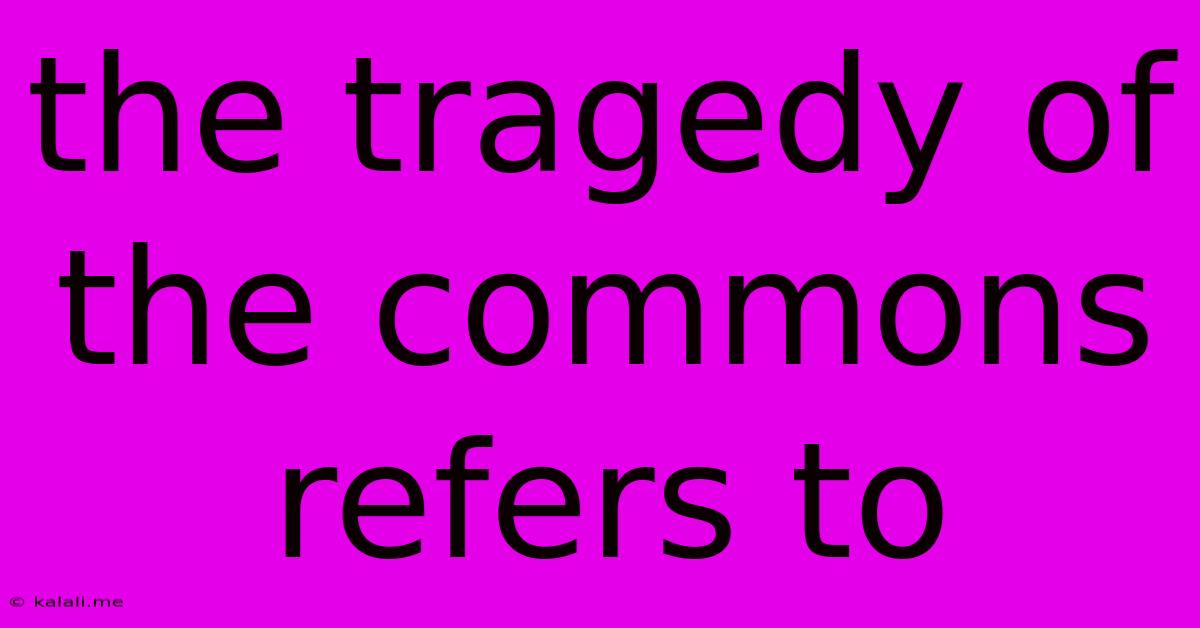The Tragedy Of The Commons Refers To
Kalali
Jun 15, 2025 · 3 min read

Table of Contents
The Tragedy of the Commons: Overexploitation and the Struggle for Shared Resources
The tragedy of the commons refers to a situation where individuals with access to a shared resource (also called a common-pool resource) act in their own self-interest and, in doing so, ultimately deplete or degrade that resource for everyone. This leads to a collective loss, even though each individual's actions might seem rational in isolation. Understanding this concept is crucial for addressing environmental challenges and promoting sustainable resource management.
This article will delve into the core principles of the tragedy of the commons, explore its historical context, analyze its modern-day manifestations, and examine potential solutions to mitigate its devastating effects.
Understanding the Core Concept
The core principle hinges on the conflict between individual rationality and collective well-being. When a resource is freely available to all, individuals have an incentive to maximize their own consumption or benefit from it. This often leads to overexploitation. The rational choice for each individual is to consume as much as possible, regardless of the impact on others. However, when everyone makes this same rational choice, the resource becomes depleted, harming everyone in the long run.
This isn't necessarily a case of malicious intent; it's a consequence of the structure of the situation itself. The lack of clear ownership or effective regulation of the shared resource makes it difficult to prevent overuse.
Historical Examples and Illustrations
The classic example, often used to illustrate the tragedy, is that of a shared pasture. Each shepherd benefits from adding more sheep to the pasture, as they receive more wool and meat. However, if all shepherds do this, the pasture becomes overgrazed, leading to degradation and ultimately harming all shepherds.
Other historical examples include overfishing in shared fishing grounds and deforestation in common forests. In each case, the lack of effective regulation and individual self-interest combined to lead to resource depletion.
Modern Manifestations of the Tragedy
The tragedy of the commons isn't just a historical phenomenon; it remains a significant problem today. Modern examples include:
- Climate Change: The atmosphere acts as a global common resource. Each country's emission of greenhouse gases contributes to climate change, even if the individual contribution seems insignificant. The collective effect, however, is devastating.
- Overfishing: Overfishing continues to threaten marine ecosystems worldwide, as individual fishing vessels maximize their catch without considering the long-term sustainability of fish stocks.
- Water Pollution: Industries and individuals often discharge pollutants into shared water bodies (rivers, lakes, oceans), leading to water contamination and impacting public health and ecosystems.
- Traffic Congestion: Roads can be considered a common resource. Each driver using the road contributes to congestion, even though individual choices to drive seem reasonable.
Solutions and Mitigation Strategies
Addressing the tragedy of the commons requires a multi-faceted approach. Several solutions have been proposed and implemented with varying degrees of success:
- Regulation and Legislation: Governments can implement laws and regulations to limit access to shared resources or impose quotas on their usage. This could involve fishing quotas, emission standards, or restrictions on water usage.
- Privatization: Dividing the common resource into privately owned parcels can incentivize individuals to manage their portion sustainably, as they bear the cost of depletion.
- Community-Based Management: Local communities can develop their own rules and systems for managing shared resources, fostering a sense of collective responsibility and promoting sustainable practices.
- Market-Based Mechanisms: Using market mechanisms like carbon trading or tradable fishing permits can create incentives for resource conservation.
- Education and Awareness: Raising public awareness about the tragedy of the commons can encourage responsible behavior and promote sustainable practices.
The tragedy of the commons highlights the inherent tension between individual self-interest and collective well-being. Understanding this concept is crucial for developing effective strategies to manage shared resources sustainably and prevent environmental degradation. The solutions outlined above represent different approaches, and the optimal strategy will often vary depending on the specific resource and the context in which it is utilized.
Latest Posts
Latest Posts
-
Difference Between Center Of Gravity And Centroid
Jun 16, 2025
-
Which Figure Has At Least One Line Of Symmetry
Jun 16, 2025
-
Which Heart Chamber Has The Thickest Muscle Wall
Jun 16, 2025
-
What Is The Factors Of 135
Jun 16, 2025
-
Match Each Threat To Internal Validity To The Appropriate Description
Jun 16, 2025
Related Post
Thank you for visiting our website which covers about The Tragedy Of The Commons Refers To . We hope the information provided has been useful to you. Feel free to contact us if you have any questions or need further assistance. See you next time and don't miss to bookmark.